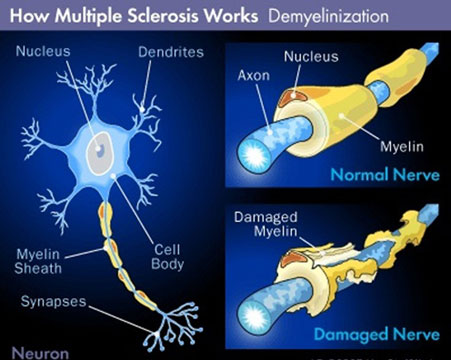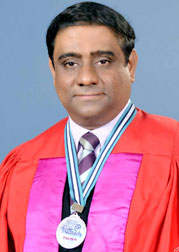|
 Today
is World Multiple Sclerosis (MS) Day: Today
is World Multiple Sclerosis (MS) Day:
Patients can lead near normal lives with available therapies
500 diagnosed, over 2,000 undiagnosed cases in Sri
Lanka:
By Carol Aloysius
It is a severe crippling disease that affects the central nervous
system. Considered as the commonest disabling neurological disease, it
affects mainly young people from 20 years to 40 years, robbing them of
their vision, numbness of limbs and a number of other debilitating
health impacts. Yet, Multiple Sclerosis (MS) is a relatively little
known condition - not just in Sri Lanka, but even in the West where it
is more common.
Although in Sri Lanka recent surveys by the Multiple Sclerosis
Society (MSAL) revealed five hundred diagnosed cases, it is believed the
actual number of undiagnosed patients is over four times this number -
probably over 2,000.
In an interview with the Sunday Observer, President of MSAL, and
Consultant Neurologist and Head Department of Neurology, Colombo South
Teaching Hospital, Dr Bimsara Senanayake says that therapies are now
available and accessible in Sri Lanka to diagnose and control the
progress of the disease and emphasises that early diagnosis and
treatment can help them lead near normal lives.
Excerpts...
Q: Multiple Sclerosis (MS) is relatively little known in Sri
Lanka. What is it?
A. MS is a neurological disease which affects the central
nervous system (CNS). The CNS comprises the brain and the spinal cord.
Although less well known in Sri Lanka compared to other neurological
diseases it is the commonest disabling neurological disease to affect
young people in the western world.
|

Dr Bimbsara Senanayake |
It is a demyelinating disease, which simply means that the insulating
covers of nerve cells called myelin in the brain and spinal cord gets
damaged due to an immune reaction. As a result, a range of signs and
symptoms like sudden loss of vision, unsteadiness of gait, weakness and
numbness of limbs occur. What is unique about the worldwide distribution
of MS is that it is more common in people who live further from the
equator and more common in regions with northern European populations.
MS affects around 2.5 million people globally.
Q: How common is this problem here in Sri Lanka? Who are at
highest risk?
A. MS affects young people in the best and the most productive
years of their lives usually between the ages of 20-40 years. It is
common in young girls (approx. 90%) by far. Research in Sri Lanka shows
that the average age at onset of MS is 29 years and 87% are females. We
have around 500 diagnosed cases of MS in Sri Lanka and we believe that
we have almost 4 times (approximately 2000) that number undiagnosed in
the community. Hence, this is a growing medical problem affecting young
people in this country.
Q: Why?
A. Diagnosing MS is difficult and it is a highly specialized
process as some other conditions also can mimic it.
Q:. So how do you diagnose it?
A. Clinical history is important. Usually patients experience
episodes of neurological deficits e.g. sudden loss of vision with pain
in one eye or both, unsteadiness and walking difficulty, weakness in one
or more limbs, paralysis of both lower limbs with urinary retention and
numbness up to the level of the chest etc. These episodes lasting more
than 24 hours come and go. Hence commonly, MS is relapsing and
remitting. Magnetic Resonance Imaging (MRI) of the brain and spine will
show 'whitish scars' which are known as demyelinating plaques. They
occur in different places of the Central Nervous System (CNS) from time
to time and the symptoms depend on where these plaques are located e.g.
if over the optic nerve the patient may have painful visual loss. Spinal
fluid is extracted with a lumber puncture and then examined. It may show
a special protein called oligoclonal bands which is produced in the
brain fluid. Also an eye test to examine the optic nerve called visual
evoked responses helps. However, there is no single test to diagnose MS.
Q: What mimics MS?
A. Patients with a similar condition known as neuromyelitis
optica (NMO) were lumped together with MS until 2004 when a special
antibody test for NMO (anti-AQP4) was discovered in Mayo clinic USA.
When positive, this antibody test clearly distinguishes NMO from MS. It
is important to differentiate these because the two conditions are
treated differently. We have established a link with Mayo USA which is
helping us to detect this antibody in suspected cases as part of a
collaborative study, free of charge. We have so far sent serum samples
of over 350 patients to be tested in Mayo clinic USA. The serum
collecting centre for the entire country is at our unit, Department of
Neurology, Colombo South Teaching Hospital.
Q: What causes MS? Is it infectious?
A. In MS, the immune system attacks the protective sheath
(myelin) that covers nerve fibres. What exactly causes this is unclear.
It could be a combination of autoimmune, environmental and genetic
factors. If one of your parents or siblings has had MS, you are possibly
at a higher risk of developing the disease. A variety of viruses have
been linked to MS, including Epstein-Barr. However MS is not an
infective disease and does not spread from person to person.
Q: Are there drugs, vitamins that can prevent or protect
persons at risk of the disease?
A. Studies show that maintaining adequate levels of vitamin D
may have a protective effect and lower the risk of developing MS.
Connection between vitamin D and MS could be tied to the positive
effects vitamin D has on the immune system.
Q: How do you treat MS?
A. Acute episodes or relapses are treated with intravenous
steroids. On the longer term disease modifying therapies (DMTs) are used
to reduce the number of relapses. Relapse reduction may lead to a better
quality of life and perhaps lesser permanent disability.
Q: What are the complications when the disease advances? Can
it lead to early death?
A. With repeated relapses the patients can get disabled. They
may become wheel chair or bed bound, with severe paralysis. Also they
may go blind. MS related tremor is another major disabling complication.
They also may develop bladder complications with incontinence, severe
fatigue, cognitive deficits, and neuropsychiatric symptoms. Usually it
does not affect life expectancy. However no two patients with MS behave
in the same manner.
Q: What treatment facilities do we have for MS patients in Sri
Lanka? What are the gaps in this area?
A. MS is diagnosed by neurologists or brain specialists. Over
the past two decades the number of neurologists in Sri Lanka has more
than doubled. Now we have at least one neurology centre in the state
sector in all nine provinces of the island. There is easier access to
MRI imaging and other investigations. There is greater awareness about
the existence of this condition in Sri Lanka amongst all medical
professionals resulting in more referrals to neurologists for
evaluation. However, once diagnosed we have difficulty in offering DMTs
to all deserving patients due to the costs involved. We are currently in
the process of discussing the possibility of greater funding for this
purpose with the health authorities. For those who are really disabled,
neuro-rehabilitation is necessary. There are many deficiencies in that
aspect here in Sri Lanka. Care giving, MS specialist nursing,
counselling and psycho social support are also areas in which we need to
improve tremendously.
Q: Stigma and myths surrounding MS often prevent patients from
seeking treatment. What is your advice to families, the public and
community in general?
A. People need to know that MS is a neurological disorder
which can be significantly controlled if diagnosed and treated early.
You can lead a near normal life with MS if relapses and complications
are minimised. It does not directly affect your reproductive or sexual
life and it is possible to get pregnant with MS. It is not a contagious
disease and does not always run in families.
Q: MS patients like all persons with disabilities have rights
- to health care, easy access to public buildings, education, and life
skills. Do they have these rights here? What has the Multiple Sclerosis
Society of Sri Lanka done about this?
A. Good question. We have now managed to get MS listed as a
critical illness in such lists belonging to insurance companies enabling
these patients to make a claim. Rights of the differently abled
individuals due to whichever cause, also applies to MS patients.
Multiple Sclerosis Society of Lanka (MSAL) also plays an important role
in securing these rights for MS patients here in Sri Lanka.
Q: Finally what is your advice to families who have an MS
patient?
A. Be supportive to your loved one. There are well trained
specialist neurologists in Sri Lanka who are capable of handling the
problems associated with MS. Do not be hesitant to seek their help.
Although alternative therapies could help do not neglect early symptoms.
Early diagnosis and treatment could be crucial for the well being of
your patient.
(For more information contact Dr Bimbsara
Senanayake at the Neurology Department, Colombo South Teaching
Hospital.) |

